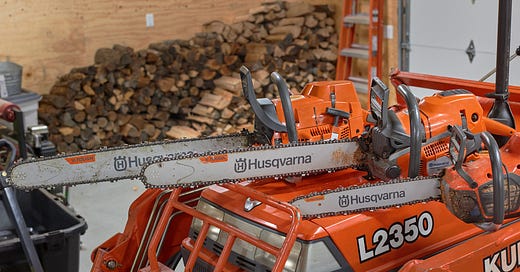Electric chainsaws and the gorge of misery
Lithium batteries are great -- so why do mid-size electric power tools suck in 2024?
In the previous article, I mentioned the California ban on certain gas-powered tools. I noted that in the suburbs, the legislation makes perfect sense: battery-operated equipment is less noisy, less polluting, and quite adequate for most yard work.
This might have left some readers scratching their heads: intuitively, it feels that the technology should be ready for rural use too. We know how to make excellent cordless screwdrivers and can build blazing-fast electric cars; the stuff in between should be a piece of cake. Countless YouTube influencers gush over battery-operated snowblowers, wood chippers, chainsaws, and other gear they receive from their sponsors for free.
Yet, YouTube is not real life; there is a “gorge of misery” between benchtop power tools and electric supercars. I own a couple of fancy chainsaws that I use for forest maintenance. Here’s my video showing the performance of a mid-range gas-powered Husqvarna 562 XP, next to a top-of-the-line battery-powered Husqvarna 540i XP:
The issue is that much of the chassis of the electric saw is occupied by the battery; there is a fairly puny motor that spins fast, delivers little torque, and is prone to overheating if bogged down. The manufacturer’s solution is to make the chain light and thin — and to equip it with smaller, less aggressive (semi-chisel) teeth.
In the usual YouTube review, the saw is slicing through a neatly-trimmed log sitting on a sawbuck. In this setup, the tool is helped by gravity; it chews through the material slowly but steadily. But in a horizontal cut — and in other less-than-ideal situations — the chain doesn’t grab the material well. The operator has to do all the pushing, and a slight twist or a lightly pinched bar is enough to stall the saw.
Again, for suburban landowners, this doesn’t matter. Heck, for routine work, ratcheting loppers and a hand saw are usually enough; “whole tree” problems often require getting a permit and hiring a licensed arborist. But for rural parcels, the alternatives to gas are — pun intended — not so clear-cut.




The obvious solution is to put the battery into a backpack form, then it can have a lot more storage capacity and the tool itself can have a more powerful (larger) motor. Until you can buy more sensible electric feild tools you could DIY this, give or take any proprietary controller nonsense some manufacturers may inflict on customers. Batteries go in backpack, armoured cable goes to tool, and there is a custom plug that fits into where the battery would go.
As a counterdatapoint of sorts: I recently chopped down and cut into pieces around 60 pine and acacia trees with an electric battery-powered chainsaw. It was fine. And yes, some of these trees were pretty thick (certainly more than the 30cm length of the chainsaw). It was real forest maintenance, not cutting through a log placed on a stand.
You do need to have the right technique, as you can't just power through your lack of skills. Yes, the saw does stall if you are not careful. But there are advantages: the thing is quiet and doesn't require any hearing protection, if you get kickback it is substantially less severe, you don't have to deal with gasoline, and you don't have to breathe poisonous fumes from what is pretty much the most polluting type of engine on the planet (read up on two stroke engines in handheld tools if you don't believe me).
My take on this is that while I wouldn't want to use this tool as lumberjack felling oak trees every day, it turned out to be just the tool for me. And while I also think YouTube "reviewers" are full of it, I actually ended up liking the tool, even though I bought it as more of an experiment.
For those who would like the details: I used a Ryobi OCS1830 and 2 or 3 5Ah batteries. I didn't need more batteries, because I would normally need to rest after about 1-2h of work. This chainsaw is OK, except for the rather poor range of length adjustments which means you'll be going through chains pretty quickly. Annoying and I suspect it's a business decision as well, but I can live with it.
In other words, I would respectfully suggest that battery-powered chainsaws are not something that should be outright rejected, unless you really have to go through a lot of hardwood.